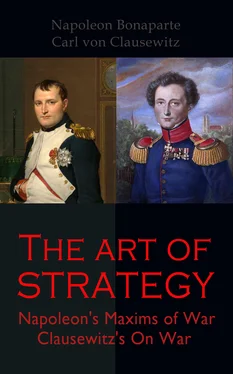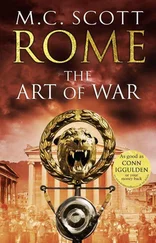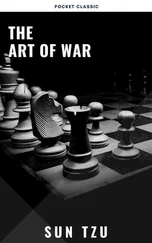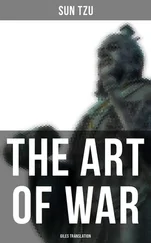1 ...7 8 9 11 12 13 ...53 Thus, by having forgotten this principle, that a flank march is never to be made before an enemy in line of battle , Frederick lost his army at Kollin; and Soubise, at Rosbach, lost both his army and his honor.
Table of Contents
When you determine to risk a battle, reserve to yourself every possible chance of success, more particularly if you have to deal with an adversary of superior talent; for if you are beaten, even in the midst of your magazines and your communications, wo to the vanquished!
“We should make war,” says Marshal Saxe, “without leaving anything to hazard, and in this especially consists the talent of a general. But when we have incurred the risk of a battle, we should know how to profit by the victory, and not merely content ourselves, according to custom, with possession of the field.”
It was by neglecting to follow up the first success, that the Austrian army, after gaining the field of Marengo, saw itself compelled on the following day to evacuate the whole of Italy.
General Melas, observing the French in retreat, left the direction of the movements of his army to the chief of his staff, and retired to Alexandria to repose from the fatigues of the day. Colonel Zach, equally convinced with his general that the French army was completely broken, and consisted only of fugitives, formed the divisions in column of route.
By this arrangement, the imperial army prepared to enter upon its victorious march in a formation not less than three miles in depth.
It was near four o’clock when General Desaix rejoined the French army with his division. His presence restored in some degree an equality between the contending forces; and yet Napoleon hesitated for a moment whether to resume the offensive, or to make use of this corps to secure his retreat. The ardor of the troops to return to the charge, decided his irresolution. He rode rapidly along the front of his divisions, and addressing the soldiers—“We have retired far enough for to-day,” said he; “you know I always sleep upon the field of battle!”
The army, with unanimous shout, proclaimed to him a promise of victory. Napoleon resumed the offensive. The Austrian advance guard, panic-struck at the sight of a formidable and unbroken body presenting itself suddenly at a point where, a few moments before, only fugitives were to be seen, went to the right about, and carried disorder into the mass of its columns. Attacked immediately afterward, with impetuosity, in its front and flanks, the Austrian army was completely routed.
Marshal Daun experienced nearly the same fate as General Melas, at the battle of Torgau, in the campaign of 1760.
The position of the Austrian army was excellent. It had its left upon Torgau, its right on the plateau of Siptitz, and its front covered by a large sheet of water.
Frederick proposed to turn its right in order to make an attack upon the rear. For this purpose he divided his army into two corps, the one under the orders of Ziethen, with instructions to attack in front, following the edge of the water; the other under his own immediate command, with which he set out to turn the right of the Austrians. But Marshal Daun having had intimation of the movements of the enemy, changed his front by countermarching, and was thus enabled to repel the attacks of Frederick, whom he obliged to retreat. The two corps of the Prussian army had been acting without communication. Ziethen, in the meantime, hearing the fire recede, concluded that the king had been beaten, and commenced a movement by his left in order to rejoin him; but falling in with two battalions of the reserve, the Prussian general profited by this reinforcement to resume the offensive. Accordingly he renewed the attack with vigor, got possession of the plateau of Siptitz, and soon after of the whole field of battle. The sun had already set when the King of Prussia received the news of this unexpected good fortune. He returned in all haste, took advantage of the night to restore order in his disorganized army, and the day after the battle occupied Torgau.
Marshal Daun was receiving congratulations upon his victory, when he heard that the Prussians had resumed the offensive. He immediately commanded a retreat, and at daybreak the Austrians repassed the Elbe with the loss of twelve thousand men, eight thousand prisoners, and forty-five pieces of cannon.
After the battle of Marengo, General Melas, although in the midst of his fortresses and magazines, saw himself compelled to abandon everything, in order to save the wreck of his army.
General Mack capitulated after the battle of Ulm, although in the centre of his own country.
The Prussians, in spite of their depôts and reserves, were obliged, after the battle of Jena, and the French after that of Waterloo, to lay down their arms.
Hence, we may conclude that the misfortune that results from the loss of a battle, does not consist so much in the destruction of men and of materiel as in the discouragement which follows this disaster. The courage and confidence of the victors augment in proportion as those of the vanquished diminish; and whatever may be the resources of an army, it will be found that a retreat will degenerate rapidly into a rout unless the general-in-chief shall succeed, by combining boldness with skill, and perseverance with firmness, in restoring the morale of his army.
Table of Contents
The duty of an advanced guard does not consist in advancing or retiring, but in manœuvring. An advanced guard should be composed of light cavalry, supported by a reserve of heavy cavalry, and by battalions of infantry, supported also by artillery. An advanced guard should consist of picked troops, and the general officers, officers and men, should be selected for their respective capabilities and knowledge. A corps deficient in instruction is only an embarrassment to an advanced guard.
It was the opinion of Frederick that an advanced guard should be composed of detachments of troops of all arms. The commander should possess skill in the choice of ground, and he should take care to be instantly informed, by means of numerous patrols, of everything passing in the enemy’s camp.
In war, it is not the business of an advanced guard to fight, but to observe the enemy, in order to cover the movements of the army. When in pursuit, the advanced guard should charge with vigor, and cut off the baggage and insulated corps of the retiring enemy. For this purpose, it should be reinforced with all the disposable light cavalry of the army.
Table of Contents
It is contrary to the usages of war to allow parks or batteries of artillery to enter a defile, unless you hold the other extremity. In case of retreat, the guns will embarrass your movements and be lost. They should be left in position, under a sufficient escort, until you are master of the opening.
Nothing encumbers the march of an army so much as a quantity of baggage. In the campaign of 1796, Napoleon abandoned his battering train under the walls of Mantua, after spiking the guns and destroying the carriages. By this sacrifice, he acquired a facility of manœuvring rapidly his little army, and obtained the initiative as well as a general superiority over the numerous but divided forces of Marshal Wurmser.
In 1799, during his retreat in Italy, General Moreau being compelled to manœuvre among the mountains, preferred separating himself entirely from his reserve artillery, which he directed upon France by the Col de Fenestrelle, rather than embarrass his march with this part of his equipment.
These are the examples we should follow; for if, by a rapidity of march, and a facility of concentration upon decisive points, the victory is gained, the materiel of an army is soon re-established. But if, on the other hand, we are beaten and compelled to retreat, it will be difficult to save our equipments, and we may have reason to congratulate ourselves that we abandoned them in time to prevent them from augmenting the trophies of the enemy.
Читать дальше












